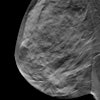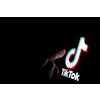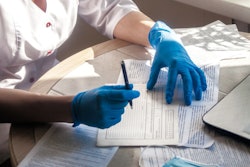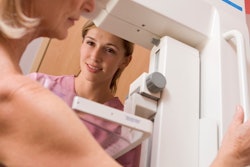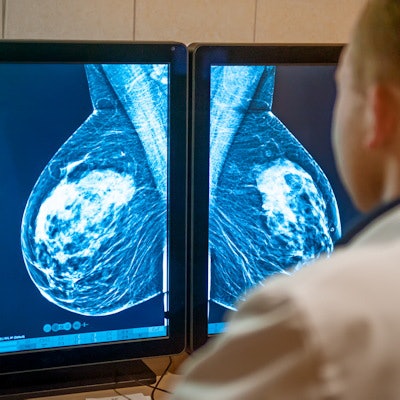
Nearly half of women between the ages of 40 and 49 don't receive their recommended annual mammograms, a gap that radiologists could help to fill by educating patients and providers, according to research published August 12 in Academic Radiology.
After reviewing survey data from nearly 2,000 women, researchers led by Yasaswi Vengalasetti from Stanford University found that the most common reasons for women of this age group not receiving their annual screening mammogram included not having thought about it or putting breast screening off.
"While deficits in shared decision making in women younger than 50 years related to mammography utilization exist, radiologists may be key in educating ambulatory care providers and patients about the benefits and harms of screening between the ages of 40-49 years," Vengalasetti et al wrote.
Advances in breast cancer treatments and screening mammography have led to significant decreases in breast cancer mortality over the past few decades. National health organizations agree that annual mammograms are beneficial for women at average risk, but there are differences in the recommended age to start screening, as well as how often women should be routinely screened.
For example, the U.S. Preventive Services Task Force's (USPSTF) guidelines state that routine screening mammography should be an individual decision before the age of 50 years. Shared decision-making between patients and physicians are also recommended for this age group. Meanwhile, the American College of Radiology (ACR) recommends that screening start at the age of 40.
Vengalasetti and colleagues wrote that primary care doctors in ambulatory care practice often adhere to USPSTF guidelines and noted a lack of data exploring the influence of shared decision-making discussions on screening mammography engagement. The researchers wanted to look at patient-reported reasons and predictors of mammography use in women between the ages of 40-49 years.
To accomplish this goal, the team analyzed retrospective data from the 2018 National Health Interview Survey (NHIS). Women in this group did not have a history of breast cancer and reported sociodemographic variables. A total of 1,948 women were included in the study.
Of this group, 758 women (46.6%) reported receiving a screening mammogram within the last year, and 1,196 (61.4%) reported receiving a screening mammogram within the last two years.
| Reasons given by women for not undergoing screening mammography | |
| No reason/never thought about it | 38.2% |
| Put it off | 17.6% |
| Didn't need it | 16.9% |
| Doctor didn't order it | 8.3% |
| I'm too young | 5.3% |
The study authors also found through multiple variable analysis that lack of health insurance was the strongest predictor of not undergoing mammography, with an odds ratio of 0.357 (p < 0.001). They wrote that this may have played a part in women putting off their exams. Also, Asian non-Hispanic women were found to be less likely to report undergoing screening mammography in the last two years compared to white women (odds ratio: 0.503, p <0.001).
The researchers also noted that their results go along with findings from other studies reporting limited use of shared decision-making on routine clinical practice, "despite increased focus by researchers and policymakers."
Vengalasetti and colleagues named radiologists as "prime candidates" to help address deficits in shared decision-making when it comes to mammography use in women younger than 50 years old. This includes educating women directly in the breast imaging suite during exam visits, through social media, at community events, or during health seminars.
"Breast imagers, who have expertise in breast cancer screening and who are well-informed about national guidelines can leverage their knowledge to educate healthcare providers about different screening strategies, pros and cons of screening before the age of 50 years, and advanced imaging techniques," they wrote.
They added that these efforts can help encourage providers to engage in shared decision-making and guide discussions with patients on breast cancer screening.

